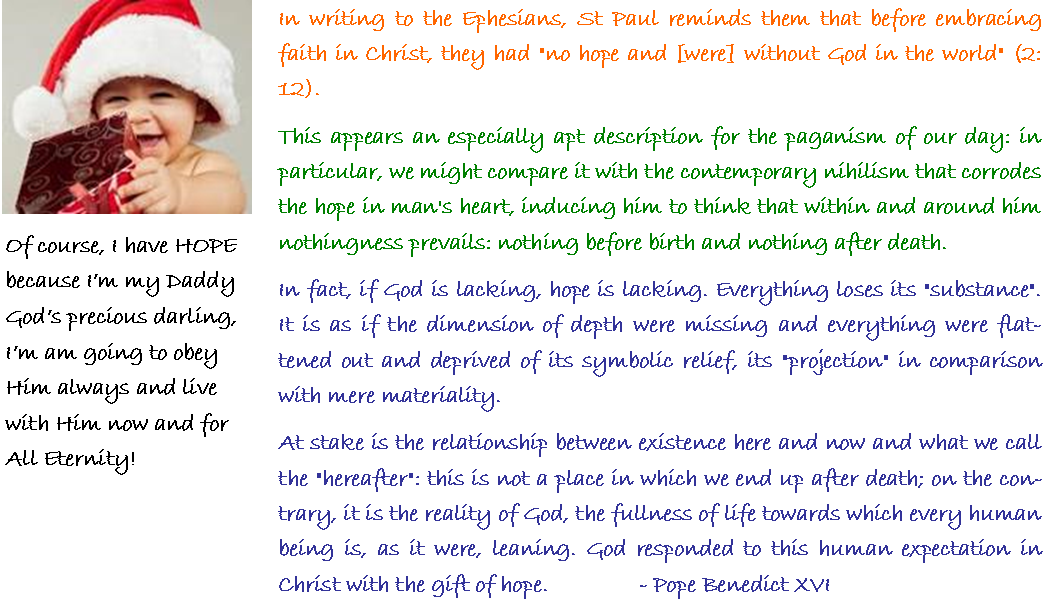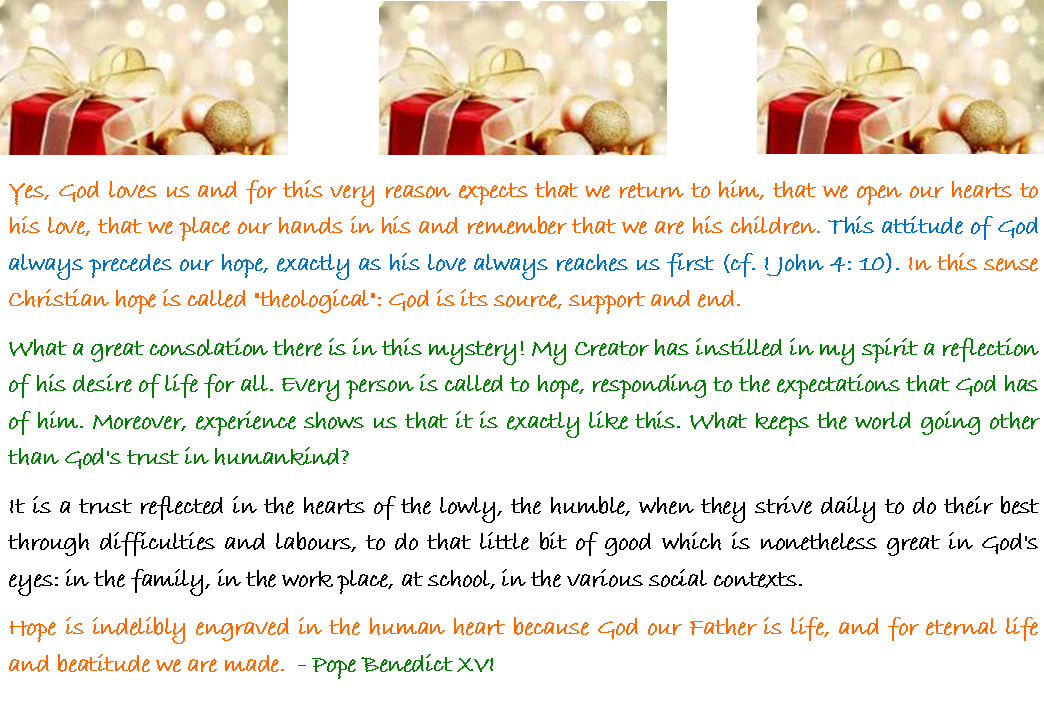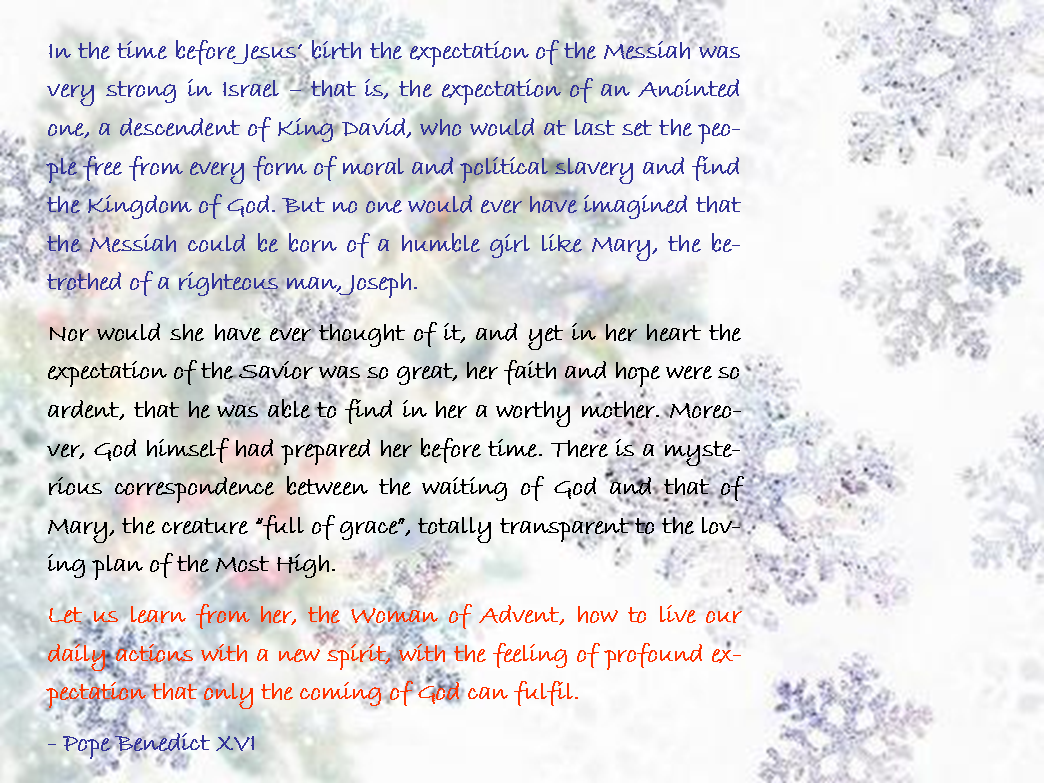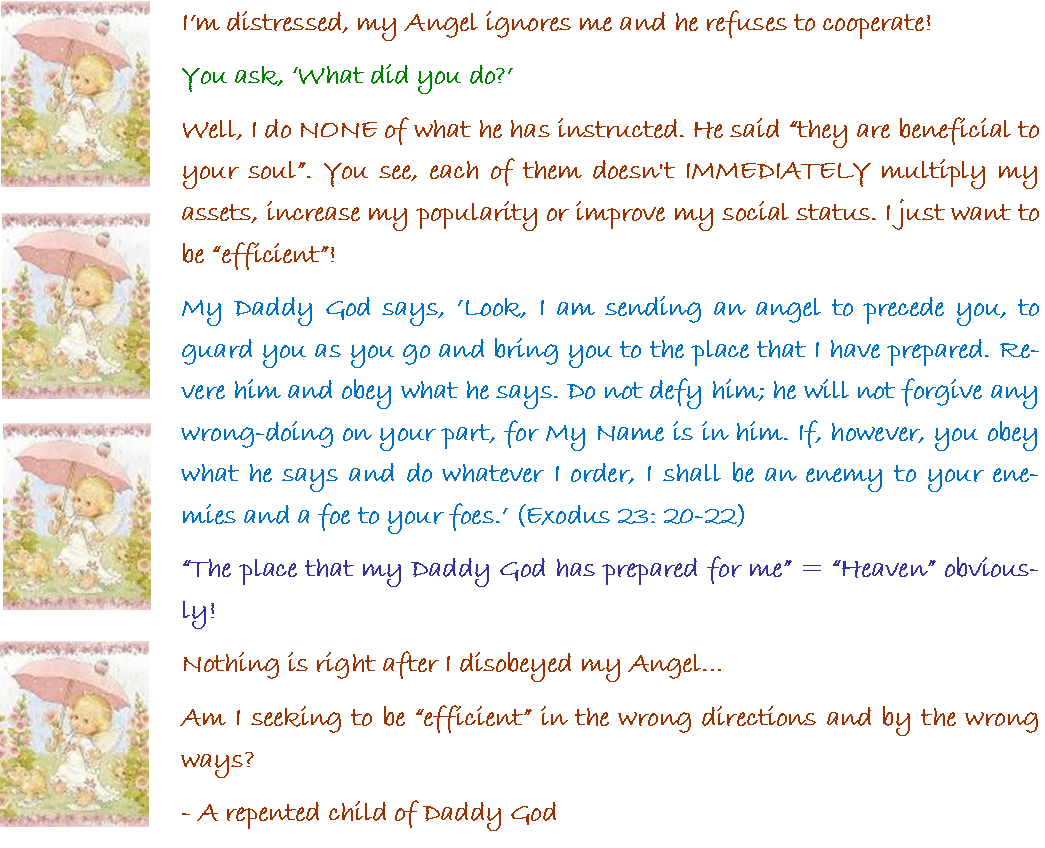|
91 |

|
Man is the one creature free to say "yes" or "no" to eternity, that is, to God. The human being is able to extinguish hope within him, eliminating God from his life. How can this be? How can it happen that the creature "made for God", intimately oriented to him, the creature closest to the Eternal One, can deprive himself of this richness? God knows the human heart. He knows that those who reject him have not recognized his true Face, and so he never ceases to knock at our door like a humble pilgrim in search of hospitality. This is why the Lord grants humanity new time: so that everyone may manage to know him! This is also the meaning of a new liturgical year which is beginning: it is a gift of God, who once again wishes to reveal himself to us in the mystery of Christ, through the Word and the Sacraments. He wants to speak to humanity and to save the people of today through the Church. And he does so by going out to meet them in order "to seek and to save the lost" (Luke 19: 10). In this perspective, the celebration of Advent is the answer of the Church-Bride to the ever new initiative of God the Bridegroom, "who is and who was and who is to come" (Revelations 1: 8). God offers to humanity, which no longer has time for him, further time, a new space in which to withdraw into itself in order to set out anew on a journey to rediscover the meaning of hope.
Here, then, is the surprising discovery: my, our hope is preceded by the expectation which God cultivates in our regard! Yes, God loves us and for this very reason expects that we return to him, that we open our hearts to his love, that we place our hands in his and remember that we are his children. This attitude of God always precedes our hope, exactly as his love always reaches us first (cf. I John 4: 10). In this sense Christian hope is called "theological": God is its source, support and end. What a great consolation there is in this mystery! My Creator has instilled in my spirit a reflection of his desire of life for all. Every person is called to hope, responding to the expectations that God has of him. Moreover, experience shows us that it is exactly like this. What keeps the world going other than God's trust in humankind? It is a trust reflected in the hearts of the lowly, the humble, when they strive daily to do their best through difficulties and labours, to do that little bit of good which is nonetheless great in God's eyes: in the family, in the work place, at school, in the various social contexts. Hope is indelibly engraved in the human heart because God our Father is life, and for eternal life and beatitude we are made. |

|
Every child born is a sign of trust in God and man and a confirmation, at least implicit, of the hope in a future open to God's eternity that is nourished by men and women. God has responded to this human hope, concealing himself in time as a tiny human being. St Augustine wrote: "We might have thought that your Word was far distant from union with man, if this Word had not become flesh and dwelt among us" (Conf. X, 43, 69, cited in Spe Salvi, n. 29). Thus, let us allow ourselves to be guided by the One who in her heart and in her womb bore the Incarnate Word. O Mary, Virgin of expectation and Mother of hope, revive the spirit of Advent in your entire Church, so that all humanity may start out anew on the journey towards Bethlehem, from which it came, and that the Sun that dawns upon us from on high will come once again to visit us (cf. Luke 1: 78), Christ our God. Amen.
BENEDICT XVI ANGELUS St Peter's Square (Video)
Dear Brothers and Sisters,
Today, the first Sunday of Advent, the Church begins a new Liturgical Year, a new journey of faith that on the one hand commemorates the event of Jesus Christ and, on the other, opens to its ultimate fulfilment. It is precisely in this double perspective that she lives the Season of Advent, looking both to the first coming of the Son of God, when he was born of the Virgin Mary, and to his glorious return, when he will come “to judge the living and the dead”, as we say in the Creed. I would now like to focus briefly on this evocative theme of “waiting”, for it touches upon a profoundly human aspect in which the faith becomes, so to speak, completely one with our flesh and our heart.
Expectation or waiting is a dimension that flows through our whole personal, family and social existence. Expectation is present in thousands of situations, from the smallest and most banal to the most important that involve us completely and in our depths. Among these, let us think of waiting for a child, on the part of a husband and wife; of waiting for a relative or friend who is coming from far away to visit us; let us think, for a young person, of waiting to know his results in a crucially important examination or of the outcome of a job interview; in emotional relationships, of waiting to meet the beloved, of waiting for the answer to a letter, or for the acceptance of forgiveness.... One could say that man is alive as long as he waits, as long as hope is alive in his heart. And from his expectations man recognizes himself: our moral and spiritual “stature” can be measured by what we wait for, by what we hope for. |

|
Every one of us, therefore, especially in this Season which prepares us for Christmas, can ask himself: What am I waiting for? What, at this moment of my life, does my heart long for? And this same question can be posed at the level of the family, of the community, of the nation. What are we waiting for together? What unites our aspirations, what brings them together? In the time before Jesus’ birth the expectation of the Messiah was very strong in Israel – that is, the expectation of an Anointed one, a descendent of King David, who would at last set the people free from every form of moral and political slavery and find the Kingdom of God. But no one would ever have imagined that the Messiah could be born of a humble girl like Mary, the betrothed of a righteous man, Joseph. Nor would she have ever thought of it, and yet in her heart the expectation of the Savior was so great, her faith and hope were so ardent, that he was able to find in her a worthy mother. Moreover, God himself had prepared her before time. There is a mysterious correspondence between the waiting of God and that of Mary, the creature “full of grace”, totally transparent to the loving plan of the Most High. Let us learn from her, the Woman of Advent, how to live our daily actions with a new spirit, with the feeling of profound expectation that only the coming of God can fulfil.
After the Angelus:
I offer a warm welcome to the English-speaking visitors gathered here today for this "Angelus" prayer. Today, Christians begin a new Liturgical Year with the season of “Advent”, a time of preparation to celebrate the Mystery of the Incarnation. By the grace of God, may our prayer, penance and good works in this season make us truly ready to see the Lord face to face. Upon you and your families I invoke God's gifts of wisdom, strength and peace!
Acknowledgment: We thank the Vatican Publisher for allowing us to publish the Homilies of Pope Benedict XVI, so that it could be accessed by more people all over the world; as a source of God’s encouragements to all of us. |

|
Read more records on Angels > Encouragements-47 .
|